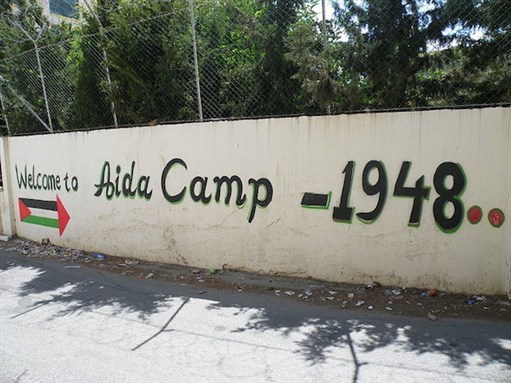The spring 2011 issue of the Arab Studies Journal was published around the time that the revolutions, uprisings, demonstrations, and protests spread across North Africa and the Middle East. The actions of individuals, communities, citizenries, and populations have challenged archaic and problematic narratives whose time has long since passed. While the global media’s fascination has somewhat dissipated, the various protest movements and uprisings, and their consequences, continue to reverberate throughout the Arab world. Though they do not address the revolutions and demonstrations directly, the four articles in this issue of ASJ attend to how historical and political narratives resonate with events in the Middle East and North Africa today.
Nadia Latif traces the transformation of the roles of Palestinian camp refugees in Lebanon in Palestinian nationalist narratives. Latif argues that regional and global political transformations over the last three decades have transformed Palestinian refugees from symbols of revolutionary struggle to signifiers of victimhood. Stacy Holden outlines the theatrics of Sultanic authority and French colonial rule in ‘Alawi Morocco by tracing the symbolic and performative aspects of the ‘Id al-Kabir sacrifice. She shows that such public rites as the Great Sacrifice provided a means of popular participation in monarchical institutions that could make or break an individual Sultan as well as systems of colonial rule. Mona Harb and Lara Deeb explore the production of an Islamic milieu in Lebanon by focusing on Hizballah’s efforts to organize notions of culture (thaqafa) and nature. Prashant Keshavmurthy offers an interpretation of the preface to Muhammad ‘Awfi’s Lubab al-Albab, the biographical dictionary of Persian language poets completed in 1221 CE. Keshavmurthy argues that ‘Awfi anticipated and challenged the notion that “temporal distance” from a text’s empirical origins could facilitate rather than impede its understanding.
The book review section of this issue attends to the materiality of cultural production and consumption, and attunes us to local and global politics, and the power of economic interests. The reviews focus on books with such diverse subjects as nineteenth-century Tunisia, masculinity in a Uyghur community in Xinjiang China, the US military’s devastating sieges of al-Falluja in 2004, and the scholarly networks of eighteenth-century polymath Murtada al-Zabidi. Many of the books reviewed examine the connections between neoliberalism, state violence, colonialism, and anti-colonial nationalism, while others explore the contested terrain of culture.
.jpeg\)
Content:
Articles
Culture as History and Landscape: Hizballah’s Efforts to Shape an Islamic Milieu in Lebanon
by Mona Harb and Lara Deeb
Fellahin, Fida`iyyin, Laji`in: Palestinian Camp Refugees in Lebanon as Autochthons
by Nadia Latif
Pomp and Circumstance: Royal Symbolism and the ‘Id al-Kabir Sacrifice in Morocco
by Stacy Holden
Finitude and the Authorship of Fiction: Muhammad ‘Awfi’s Preface to his Chronicle, Lubab al-Albab (The Piths of Intellects)
by Prashant Keshavmurthy
Book Reviews
Policing and Prisons in the Middle East: Formations of Coercion
Edited by Laleh Khalili and Jillian Schwedler
reviewed by Paul Amar
Redeploying the State: Corporatism, Neoliberalism, and Coalition Politics
by Hishaam D. Aidi
reviewed by Agnieszka Paczynska
Colonial Madness: Psychiatry in French North Africa
by Richard C. Keller
reviewed by Lawrence W. McMahon
Mediterraneans: North Africa and Europe in an Age of Migration, c. 1800–1900
by Julia A. Clancy-Smith
reviewed by Omar Cheta
The World of Murtada al-Zabidi (1732–91): Life, Networks, and Writings
by Stefan Reichmuth
reviewed by Dahlia E. M. Gubara
Contemporary Arab Thought: Cultural Critique in Comparative Perspective
by Elizabeth Suzanne Kassab
reviewed by Stephen Sheehi
Down a Narrow Road: Identity and Masculinity in a Uyghur Community in Xinjiang China
by Jay Dautcher
reviewed by Kelly Hammond
Egypt’s Culture Wars: Politics and Practice
by Samia Mehrez
reviewed by Elliott Colla
Beirut Bereft: The Architecture of the Forsaken and Map of the Derelict
by Photographs by Ziad Antar, text by Rasha Salti
reviewed by Sarah A. Rogers
Beaches, Ruins, Resorts: The Politics of Tourism in the Arab World
by Waleed Hazbun
reviewed by Adel Ait-Ghezala
Inside Fallujah: The Unembedded Story
by Ahmed Mansour
reviewed by Dahr Jamil
The Wilsonian Moment: Self-Determination and the International Origins of Anticolonial Nationalism
by Erez Manela
reviewed by Maggie Clinton
The Claims of Culture at Empire’s End: Syria and Lebanon under French Rule
by Jennifer M. Dueck
reviewed by Samuel Dolbee
For Better, For Worse: The Marriage Crisis That Made Modern Egypt
by Hanan Kholoussy
reviewed by Omnia El Shakry











